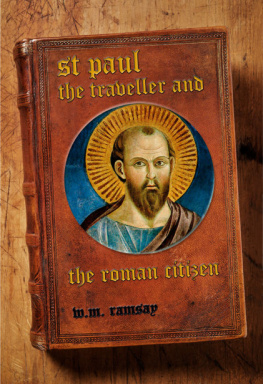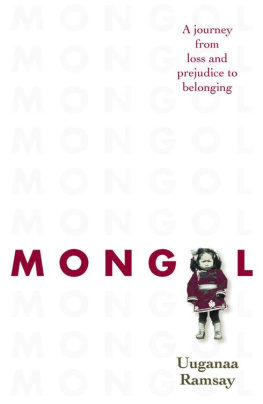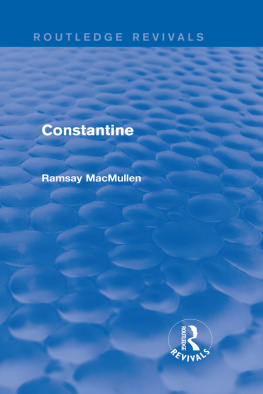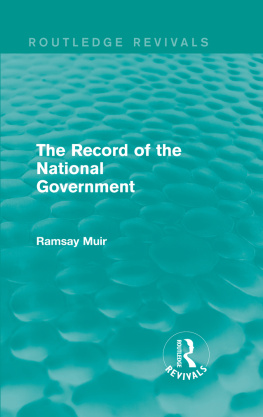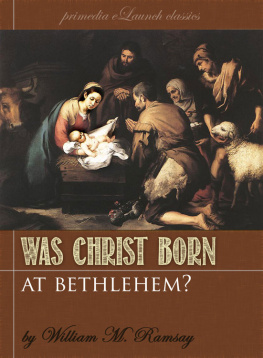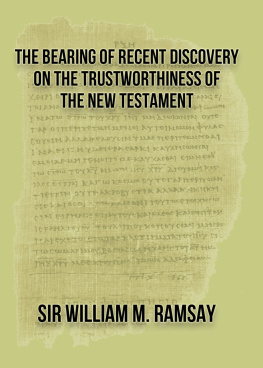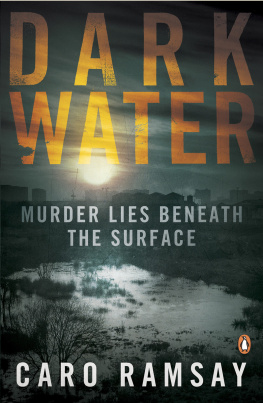St. Paul theTraveller
and the Roman Citizen
BY
W.M. RAMSAY,D.C.L., LL.D.
PROFESSOR OF THEHUMANITY, ABERDEEN
ORD. MITGLIED D.KAIS. DEUTSCH. ARCHOLOG. GESELLSCH. 1884
HON. MEMBER,ATHENIAN ARCHOLOG. SOC., 1895; FORMERLY PROFESSOR OF CLASSICAL ARCHOLOGY ANDFELLOW OF EXETER AND OF LINCOLN COLLEGE, OXFORD LEVERING LECTURER IN JOHNSHOPKINS UNIVERSITY, 1894
ELEVENTH EDITION
HODDER ANDSTOUGHTON
LONDON NEWYORK TORONTO
To
ANDREW MITCHELL , Esq.,
The Walk House,Alloa
My Dear Uncle,
In my undergraduate days, a residence inGttingen during the Long Vacation of 1874 was a critical point in my life.Then for the first time, under the tuition of Professor Theodore Benfey , I came into close relations with a great scholarof the modern type, and gained some insight into modern methods of literaryinvestigation; and my thoughts have ever since turned towards the border landsbetween European and Asiatic civilisation. That visit, like many other things,I owe to you; and now I send you the result, such as it is, the best that I cando, asking that you will allow it to go forth with your name attached to it.
I remain always, your affectionatenephew,
WILLIAM MITCHELL RAMSAY.
Kings college, Aberdeen,
17th September, 1895
Preface
When I was honouredby the invitation of Auburn Theological Seminary, I referred the matter to myfriends, Dr. Fairbairn and Dr. Sanday, who knew what were my circumstances andother duties. On their advice the invitation was accepted; and it included thecondition that the lectures must be published. In revising the printed sheets Ihave felt strongly the imperfections of the exposition; but I can feel no doubtabout the facts themselves, which seem to stand out so clear and distance, thatone has only to look and write. Hence I have not withdrawn from any of thepositions maintained in my Church in the Roman Empire before 170 (apartfrom incidental imperfections). The present work is founded on the results forwhich evidence is there accumulated; but, in place of its neutral tone, adefinite theory about the composition of Acts is heremaintained (see p.383 f.). Many references were made, at first, to pages ofthat work, and of my Cities and Bishoprics of Phrygia (1895), whereviews here assumed were explained and defended; but they had an egotisticappearance, and, on the advice of a valued friend, have been cut out from theproof-sheets.
I use in Acts the canons ofinterpretation which I have learned from many teachers (beyond all others fromMommsen) to apply to history; and I have looked at Paul and Luke as men amongmen. My aim has been to state the facts of Pauls life simply, avoidingargument and controversy so far as was possible in a subject where every pointis controverted. I have sometimes thought of a supplementary volume of Elucidationsof Early Christian History, in which reasons should be stated more fully.
It is impossible to find anything to sayabout Acts that has not been said before by somebody. Doubtless almosteverything I have to say might be supported by some quotation. But if a historyof opinion about Acts had been desired, I should not have been appliedto. Where I was conscious of having learned any special point from any specialscholar I have mentioned his name; but that, of course does not exhaust half mydebt. The interpretation of one of the great ancient authors is a long slowgrowth; one is not conscious where he learned most of his ideas; and, if hewere, their genesis is a matter of no interest or value to others. Not merelythe writers quoted, but also Schurer, Meyer-Wendt, Zckler, Holtzmann, Clemen,Spitta, Zeller, Everett, Paley, Page, and many others, have taught me; and Ithankfully acknowledge my debt. But specially Lightfoot, Lewins Fatsi Sacri,and the two greatest editors of Acts, Wetstein and Blass, have beenconstant companions.
Discussions with my wife, and with myfriends, Professor W. P. Paterson, Rev. A. F. Findlay, and above all, Prof.Rendel Harris, have cleared my ideas on many points, beyond what can bedistinctly specified. The book has been greatly improved by criticisms fromProf. Rendel Harris, and by many notes and suggestions from Rev. A. C. Headlam,which were of great value to me. Mr A. Souter, Caius College, Cambridge, hasaided me in many ways, and especially by compiling Index I. But it would bevain to try to enumerate all my obligations to many friends.
I wish to mention two facts about thegenesis of my studies in this subject: (1) Dr. Fairbairn proposed to me thesubject of St. Paul as a Citizen long ago; and I long shrank from it as toogreat and too difficult; (2) Dr. Robertson Nicoll (mindful of earlyacquaintance in Aberdeen) urged me in 1884 to write, and gave me no peace,until I published a first article,Expositor, Oct., 1888.
An apology is due for the variations,often harsh, from the familiar translation of Acts; but a littleinsertion or change often saved a paragraph.
Lectures which I had the honour to givebefore the Harvard University, Johns Hopkins University (the Levering Lectures),and Union Seminary, New York, are worked up in this volume.
Aberdeen ,23rd September, 1895
Preface to the Second Edition
T here are many sentences and paragraphs which I should have liked to rewrite, had itbeen possible, not in order to alter the views expressed, but to improve theinadequate expression.
In the new edition, however, it was notpossible to introduce any alterations affecting the arrangement of the printedlines; but some corrections and improvements have been made through the aid ofvalued correspondents and critics, especially Rev. F. Warburton Lewis, Rev. G.W. Whitaker, and the Athenaeum reviewer. Slight, but not insignificantverbal changes have been made in p. 18, 1. 8, 10, 11; 19, 1. 10; 27, 1. 14; 34,1. 8; 62, 1. 15; 98, 1. 16; 1455, 1. 5; 146, 1. 6-7; 211, 1. 11; 224, 1. 6;227, 1. 3; 242, 1. 31; 263, 1. 12; 276, 1. 27; 282, 1. 1(footnote deleted);307 n. 2 (Matt. XXVII 24, added); 330 1. 13-14; 363, 1. 5. Thepunctuation has been improved in p. 28, 1. 19, 21; and an obscure paragraph p.160, 1. 10-17 has been rewritten.
Besides correcting p. 141, 1. 9, I must apologizefor having there mentioned Dr. Chase incorrectly. I intended to cut out hisname from the proof, but left it by accident, while hesitating between twocorrections; and I did not know that it remained on that page, till he wrote meon the subject. On p. 27, 1. 14, I quoted his opinion about the solitary pointon which we seem to agree; but, as he writes that my expression makes himresponsible for what he has never maintained, I have deleted the offendingwords. He adds, may I very earnestly ask, if your work reaches a secondedition, that, if you refer to me, you will give in some conspicuous place areference to my papers in the Expositor, that those interested in thesubject may have the chance of seeing what I have really said. See TheGalatia of the Acts, Expositor, Dec., 1893, and May, 1894 the titleshows deficient geographical accuracy on the part of my distinguished opponent,for Luke never mentions Galatia, but only the Galatic Territory, and therelies one of the fine points of the problem. After finishing the Church in theRoman Empire before 170, I had no thought of troubling the world with anythingfurther on this subject; but Dr. Chases criticism roused me to renewed work,and then came the Auburn invitation. With the Galatian question the date andauthorship of Acts are bound up: the more I study, the more clearly Isee that it is impossible to reconcile the North-Galatian theory with thefirst-century origin and Lukan authorship of Acts: that theory involvesso many incongruities and inconsistencies, as to force a cool intellect to theview that
Next page
